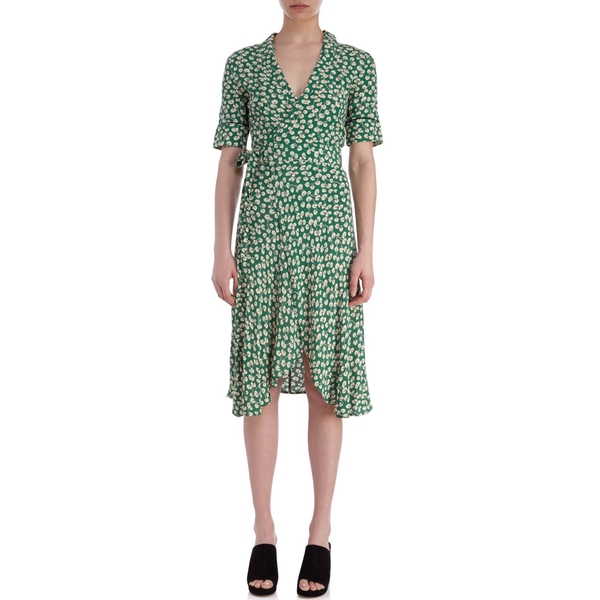
What comes to mind when you think of cult brand Ganni? Perhaps it's the label's colorful prints or its legions of impossibly cool #GanniGirls from Denmark and every other corner of the globe. What you might not associate the brand with is sustainability. As CEO Nicolaj Reffstrup told Who What Wear, that's actually by design—but that doesn't mean the brand isn't making major strides in the space.
I asked Reffstrup how Ganni balances being cool and on-trend with wanting to be known more for sustainability, and he clarified that it's actually not the end game, per se. "Well actually, we don't want to be known for it," Reffstrup told me. "From my perspective, sustainability is simply a prerequisite for being in business, so it's just something we do because we want to do it. … It will not necessarily become part of our brand DNA or the story of it. It's a different thing if you are a brand that's built entirely on sustainability. Then, of course, you should communicate about that, but we are something different. We're Ganni, and what we do in terms of sustainability is more of a moral responsibility more than anything else."
In other words, Ganni is not aiming to be the next Everlane, but the brand is still making sustainability a priority in important ways. For instance, Ganni has released a collection made from biodegradable thermoplastic, which includes a jacket, coat, bags, and hats in floral and leopard prints. Cute products that also happen to be sustainable? Talk about a win-win.
Ganni is also embracing the resale industry. "We are working with this company called Continued Fashion that's basically a white-label platform for brands to take back and resell their own product and in the end, to profit from it," Reffstrup told me. "So there are three advantages to that. First and foremost, reusing pre-worn clothes is the best thing you can do in terms of sustainability—3000% better than producing it. I don't know who calculated that, but that's what they say. Secondly, that can allow ourselves to sell a cheaper organic product and [thereby] reach a different audience. Thirdly, as I mentioned, we're hoping to also profit from it so that we are incentivized to increase that part of our business."
Reffstrup also shared other ways the brand is committed to the cause. "Over the course of the past three or four years, we've launched a number of small projects that hopefully, put together, will form a patchwork of a sustainability effort," he said. It includes policies to reduce food waste and plastic use, making vegetarian food available and converting to LED lights in its office.
Reffstrup also admitted that a little incentive never hurt anyone. "And I guess most importantly, in 2016, we started mapping our CO2 footprint and trying to offset that with carbon credits," he said. "The huge advantage of that project is that it makes you very much aware of where you spend your carbon—as you pay for it annually, you're also incentivized to reduce it. So in that sense, we've kind of imposed our own carbon tax on ourselves—there's nothing like monetary punishment to regulate behavior in humans." Ain't that the truth?
Reffstrup also admitted that a little incentive never hurt anyone. "And I guess most importantly, in 2016, we started mapping our CO2 footprint and trying to offset that with carbon credits," he said. "The huge advantage of that project is that it makes you very much aware of where you spend your carbon—as you pay for it annually, you're also incentivized to reduce it. So in that sense, we've kind of imposed our own carbon tax on ourselves—there's nothing like monetary punishment to regulate behavior in humans." Ain't that the truth?
Scroll down to shop Ganni's biodegradable items to get in on the sustainability movement for yourself.
Enregistrer un commentaire